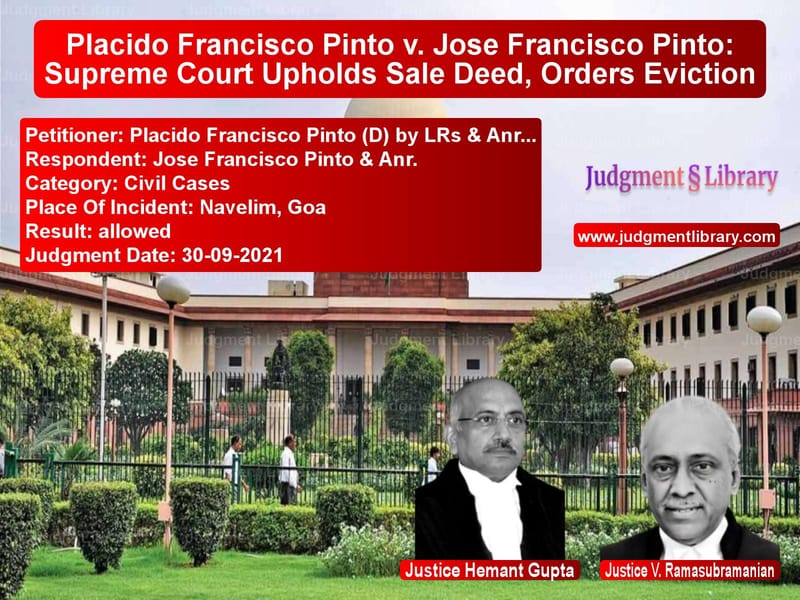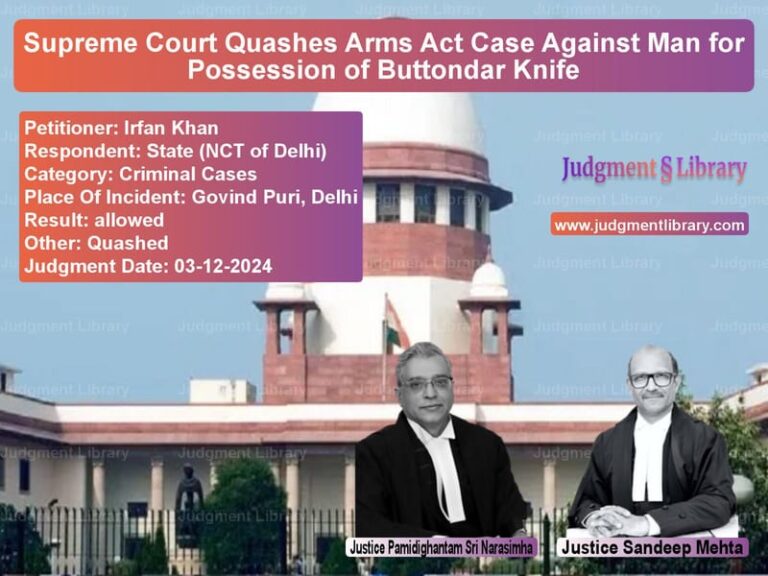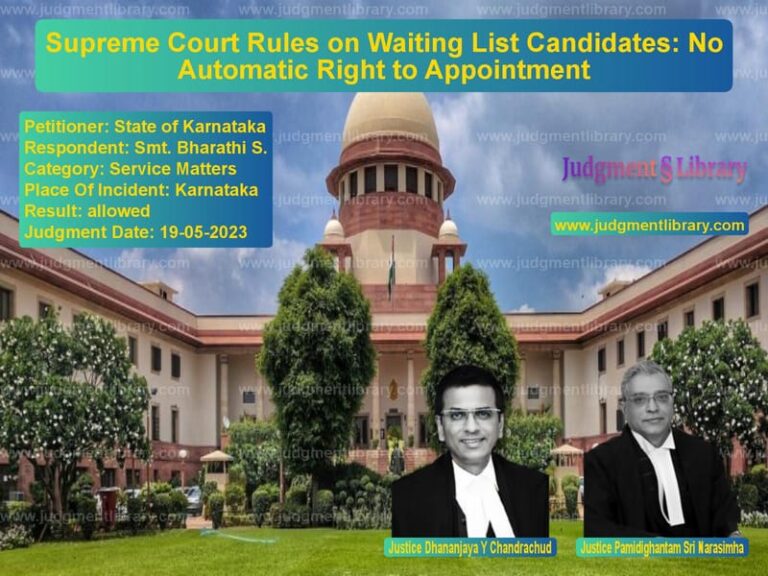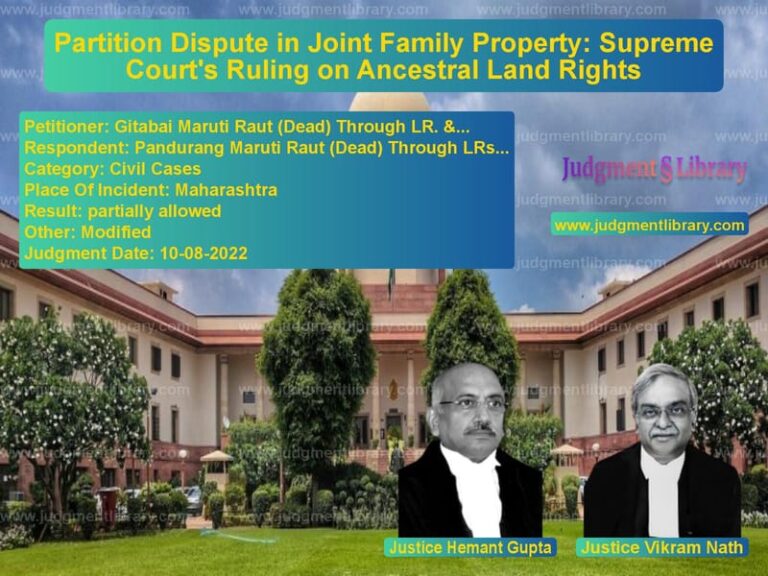Placido Francisco Pinto v. Jose Francisco Pinto: Supreme Court Upholds Sale Deed, Orders Eviction
The case of Placido Francisco Pinto (D) by LRs & Anr. v. Jose Francisco Pinto & Anr. was a prolonged family dispute over property ownership. The central issue was whether a sale deed executed in 1970 was valid or obtained through fraud and misrepresentation. The Supreme Court had to decide if the possession of the property should be handed over to the appellants or if the respondents’ claim of fraud and coercion was valid.
Background of the Case
The dispute centered around a property in Navelim, Goa, which was originally divided between two brothers through a gift deed in 1957. The elder brother, Placido Francisco Pinto (plaintiff), claimed that he purchased the southern half of the property from his younger brother, Jose Francisco Pinto (defendant), via a sale deed executed on September 14, 1970 and registered on September 23, 1970. The plaintiff stated that he settled the debts of his younger brother to prevent the property from being auctioned and, in return, the defendant agreed to sell his portion.
The defendant, however, argued that he never intended to sell the property and that the sale deed was obtained through misrepresentation. He contended that he was taken to the Sub-Registrar’s office under the pretense of signing a document acknowledging a loan repayment, not a sale deed. Based on this, he continued to occupy the property.
Legal Proceedings
Two separate suits were filed in connection with this dispute:
- First suit (Special Civil Suit No. 55/77/I): Filed by the plaintiff in 1977, seeking possession and accounts from the defendant, claiming ownership through the sale deed.
- Second suit (Special Civil Suit No. 71/80/I): Filed by the defendant in 1980, seeking to declare the sale deed null and void on the grounds of fraud and misrepresentation.
The trial court ruled in favor of the plaintiff, upholding the sale deed and ordering eviction. However, the first appellate court and the High Court reversed this decision, declaring the sale deed void.
Supreme Court’s Observations
The Supreme Court, comprising Justices Hemant Gupta and V. Ramasubramanian, examined the case and reinstated the trial court’s decision. The key points of the ruling included:
- Validity of Sale Deed: The court noted that the defendant admitted in his testimony that the plaintiff had cleared his debts, which indicated that consideration was indeed paid.
- Burden of Proof on Fraud: The court held that “misrepresentation is another facet of fraud,” and for the sale deed to be declared void, the defendant had to provide clear evidence of fraud, which he failed to do.
- Registered Documents Carry Presumption of Validity: The sale deed was properly executed and registered, and the defendant had signed it in the presence of witnesses. The court ruled that merely claiming ignorance was not sufficient to invalidate the document.
- No Proof of Coercion: The defendant’s argument that he did not understand the document was rejected as he admitted signing it in two different locations.
Key Supreme Court Statements
The Court made strong remarks regarding the responsibility of individuals signing legal documents:
“The sale deed registered in the normal course of official duties carries the presumption of correctness which cannot be said to be illegal only on the basis of feigned ignorance.”
“If the elder brother had come to the help of the younger brother, discharging his debts and executing a sale deed mentioning a nominal sale consideration, it cannot be said to be a sale without consideration.”
Read also: https://judgmentlibrary.com/iit-admission-criteria-dispute-supreme-court-upholds-iits-policy/
Legal Implications
The judgment reinforced several important legal principles:
- Registered Sale Deeds Are Presumed Valid: A sale deed cannot be invalidated merely on claims of ignorance or misunderstanding.
- Fraud Must Be Proven: Courts require clear and convincing evidence to overturn a legally executed document.
- Family Disputes Do Not Override Legal Documents: Emotional claims within families do not hold legal weight against properly executed and registered agreements.
Conclusion
The Supreme Court’s ruling in Placido Francisco Pinto v. Jose Francisco Pinto sets a strong precedent for property disputes involving claims of fraud. The judgment reinforces the principle that registered sale deeds hold legal validity unless clear proof of fraud is presented. The court’s order to evict the defendant ensures that contractual agreements are upheld and that individuals cannot claim ignorance to escape contractual obligations.
Petitioner Name: Placido Francisco Pinto (D) by LRs & Anr..Respondent Name: Jose Francisco Pinto & Anr..Judgment By: Justice Hemant Gupta, Justice V. Ramasubramanian.Place Of Incident: Navelim, Goa.Judgment Date: 30-09-2021.
Don’t miss out on the full details! Download the complete judgment in PDF format below and gain valuable insights instantly!
Download Judgment: placido-francisco-pi-vs-jose-francisco-pinto-supreme-court-of-india-judgment-dated-30-09-2021.pdf
Directly Download Judgment: Directly download this Judgment
See all petitions in Property Disputes
See all petitions in Landlord-Tenant Disputes
See all petitions in Specific Performance
See all petitions in Judgment by Hemant Gupta
See all petitions in Judgment by V. Ramasubramanian
See all petitions in allowed
See all petitions in supreme court of India judgments September 2021
See all petitions in 2021 judgments
See all posts in Civil Cases Category
See all allowed petitions in Civil Cases Category
See all Dismissed petitions in Civil Cases Category
See all partially allowed petitions in Civil Cases Category







